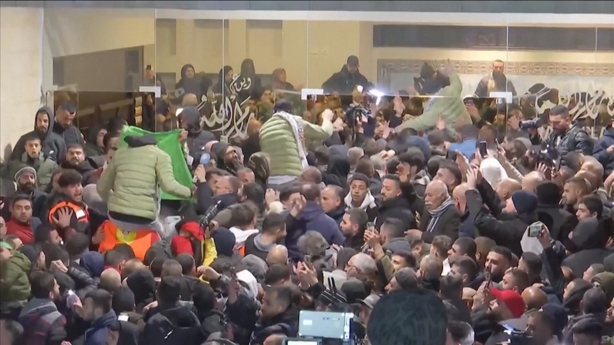Hamas handed over the bodies of four Israeli hostages while it waited for hundreds of Palestinian prisoners to be released by Israel in return, in an overnight exchange marking the final swap as part of a fragile truce in Gaza.
The ceasefire came into effect on 19 January and has largely held, despite numerous setbacks.
However its first phase is due to end this week and the fate of its next phase, which aims to end the war, remains unclear. Hamas said that it has not received any proposals so far.
After days of impasse, Egyptian mediators secured the handover of the bodies of the final four hostages in the deal's first phase, for 620 Palestinians either detained by Israeli forces in Gaza or jailed in Israel.
The four bodies have been received by Israel, Prime Minister Benjamin Netanyahu's office said in the early hours of this morning. Experts have now begun the process of identifying the remains.
Hamas had previously identified the bodies as those of Tsachi Idan, Itzhak Elgarat, Ohad Yahalomi and Shlomo Mantzur, all of whom were abducted during the 7 October 2023 attack from their kibbutz homes near Gaza.
Israel had refused to release prisoners on Saturday after Hamas handed over six hostages in a staged ceremony.
Hamas had been displaying living hostages and coffins carrying hostage remains on stage in front of a crowd in Gaza before handing them over, to sharp criticism including from the United Nations.
The final handover did not include such a ceremony.
The agreement had also been held up previously after Hamas handed over the remains of an unidentified woman instead of Shiri Bibas, before delivering the correct body the next day.
Bus carrying freed Palestinian prisoners arrives in Ramallah
A bus carrying a group of Palestinian prisoners released by Israel under the ceasefire deal arrived to a cheering crowd in the occupied West Bank city of Ramallah.
More than 600 Palestinians prisoners were to be released overnight under the ceasefire deal, most of them in Gaza, according to Hamas officials.
Wearing traditional keffiyeh scarves and jackets to cover their jail uniforms, the freed prisoners descended from the bus before a compact and jubilant crowd, then headed to a quick health checkup.
Several prisoners were hoisted in the air, some of them conducting interviews from the shoulders of friends or relatives.

The first phase of the ceasefire included the exchange of 33 Israeli hostages in total for around 2,000 Palestinian prisoners and detainees, and the withdrawal of Israeli troops from some positions in Gaza as well as an influx of aid.
But with the 42-day truce due to expire on Saturday, it remains unclear whether an extension that could see more of the 59 remaining hostages go free will happen or whether negotiations can begin on a second stage of the deal.
Talks for second phase of agreement on track - US
The United States said that talks for a second phase of the agreement are on track.
President Donald Trump's top envoy on the Middle East said that Israeli representatives were en route to talks on the next phase of the ceasefire deal.
"We're making a lot of progress. Israel is sending a team right now as we speak," Steve Witkoff told an event for the American Jewish Committee in Washington.
"It's either going to be in Doha or in Cairo, where negotiations will begin again with the Egyptians and the Qataris," he said.
Hamas has said it is ready to release "in one go" all the hostages remaining during the second phase.
On Sunday, the group accused Israel of endangering the Gaza truce by delaying the release of 620 Palestinian prisoners.
Israel justified the delay by citing concerns over how the hostages have been freed, with Mr Netanyahu describing the process as "humiliating ceremonies".
Since the ceasefire took effect on 19 January, Hamas has released 25 living hostages in public ceremonies across Gaza, where masked, armed fighters have escorted them onto stages decorated with slogans.
Israel has released more than 1,100 Palestinian prisoners.
The International Committee of the Red Cross urged all parties to carry out prisoner and hostage swaps "in a dignified and private manner".
Both sides have accused each other of violating the ceasefire, but it has so far largely held.
Israel vowed to destroy Hamas after its 7 October attack, the deadliest in the country's history, and has made bringing back all hostages seized that day one of its war objectives.
The attack that triggered the war resulted in the deaths of more than 1,200 people, most of them civilians, according to a tally of official Israeli figures.
Israel's retaliation in Gaza killed more than 48,000 people, according to the health ministry in the Hamas-run territory, figures that the United Nations deems credible.
Alongside the Gaza war, which displaced much of the territory's population of 2.4 million, Israel has intensified its military operations in the West Bank.
The Israeli army said it also carried out air strikes targeting military sites containing weapons in southern Syria, just days after Mr Netanyahu called for demilitarising the area.
At least two people were killed by a strike on one of the sites, the headquarters of a military unit southwest of Damascus, a war monitor said.
